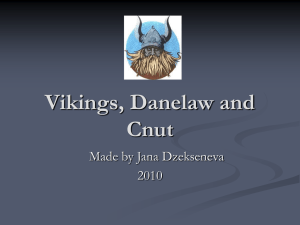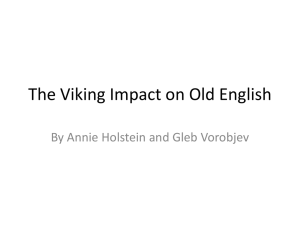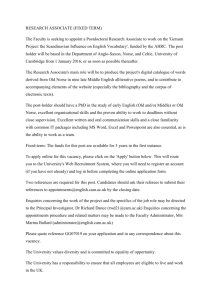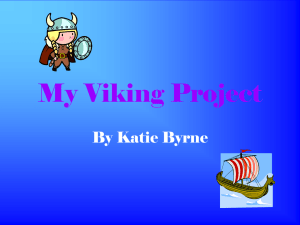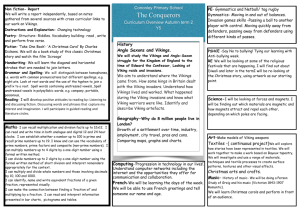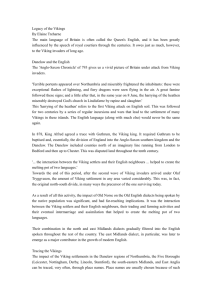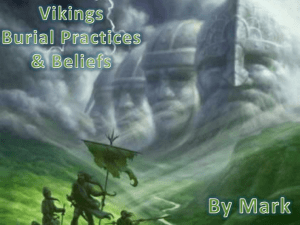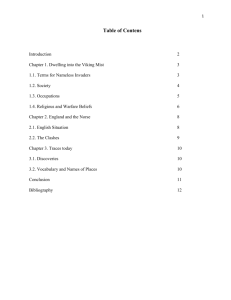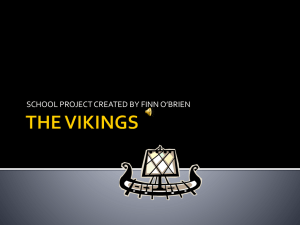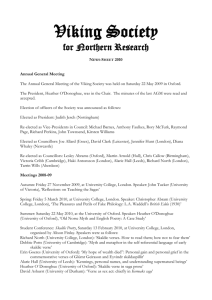The Adventure of English: The Biography of a Language
advertisement
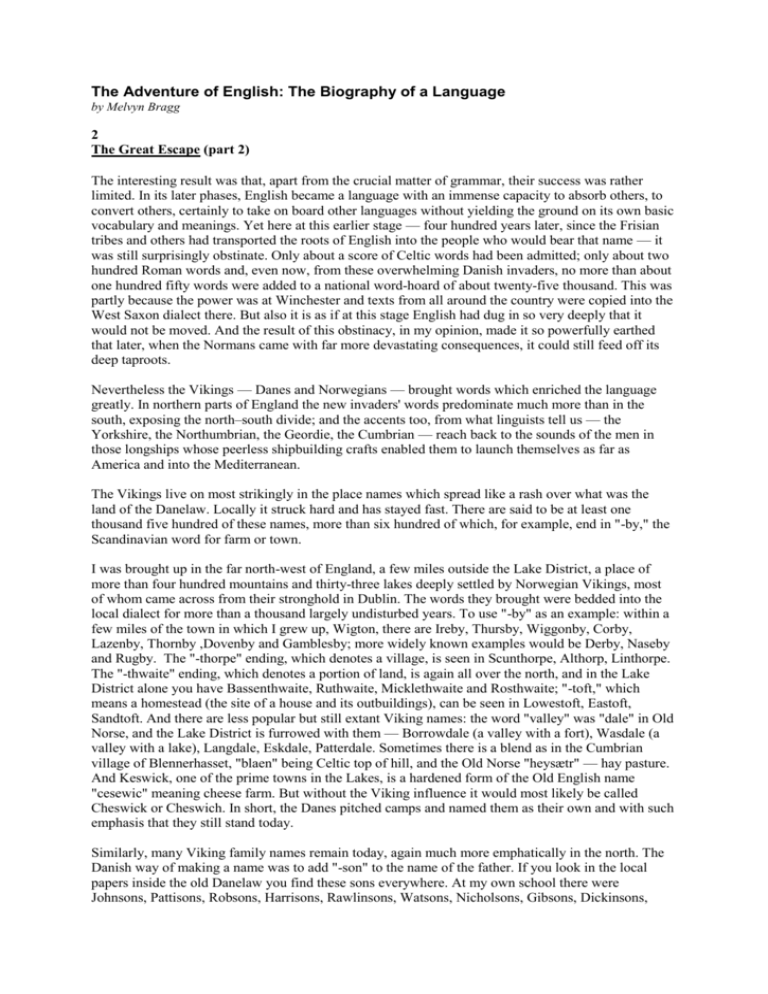
The Adventure of English: The Biography of a Language by Melvyn Bragg 2 The Great Escape (part 2) The interesting result was that, apart from the crucial matter of grammar, their success was rather limited. In its later phases, English became a language with an immense capacity to absorb others, to convert others, certainly to take on board other languages without yielding the ground on its own basic vocabulary and meanings. Yet here at this earlier stage — four hundred years later, since the Frisian tribes and others had transported the roots of English into the people who would bear that name — it was still surprisingly obstinate. Only about a score of Celtic words had been admitted; only about two hundred Roman words and, even now, from these overwhelming Danish invaders, no more than about one hundred fifty words were added to a national word-hoard of about twenty-five thousand. This was partly because the power was at Winchester and texts from all around the country were copied into the West Saxon dialect there. But also it is as if at this stage English had dug in so very deeply that it would not be moved. And the result of this obstinacy, in my opinion, made it so powerfully earthed that later, when the Normans came with far more devastating consequences, it could still feed off its deep taproots. Nevertheless the Vikings — Danes and Norwegians — brought words which enriched the language greatly. In northern parts of England the new invaders' words predominate much more than in the south, exposing the north–south divide; and the accents too, from what linguists tell us — the Yorkshire, the Northumbrian, the Geordie, the Cumbrian — reach back to the sounds of the men in those longships whose peerless shipbuilding crafts enabled them to launch themselves as far as America and into the Mediterranean. The Vikings live on most strikingly in the place names which spread like a rash over what was the land of the Danelaw. Locally it struck hard and has stayed fast. There are said to be at least one thousand five hundred of these names, more than six hundred of which, for example, end in "-by," the Scandinavian word for farm or town. I was brought up in the far north-west of England, a few miles outside the Lake District, a place of more than four hundred mountains and thirty-three lakes deeply settled by Norwegian Vikings, most of whom came across from their stronghold in Dublin. The words they brought were bedded into the local dialect for more than a thousand largely undisturbed years. To use "-by" as an example: within a few miles of the town in which I grew up, Wigton, there are Ireby, Thursby, Wiggonby, Corby, Lazenby, Thornby ,Dovenby and Gamblesby; more widely known examples would be Derby, Naseby and Rugby. The "-thorpe" ending, which denotes a village, is seen in Scunthorpe, Althorp, Linthorpe. The "-thwaite" ending, which denotes a portion of land, is again all over the north, and in the Lake District alone you have Bassenthwaite, Ruthwaite, Micklethwaite and Rosthwaite; "-toft," which means a homestead (the site of a house and its outbuildings), can be seen in Lowestoft, Eastoft, Sandtoft. And there are less popular but still extant Viking names: the word "valley" was "dale" in Old Norse, and the Lake District is furrowed with them — Borrowdale (a valley with a fort), Wasdale (a valley with a lake), Langdale, Eskdale, Patterdale. Sometimes there is a blend as in the Cumbrian village of Blennerhasset, "blaen" being Celtic top of hill, and the Old Norse "heysætr" — hay pasture. And Keswick, one of the prime towns in the Lakes, is a hardened form of the Old English name "cesewic" meaning cheese farm. But without the Viking influence it would most likely be called Cheswick or Cheswich. In short, the Danes pitched camps and named them as their own and with such emphasis that they still stand today. Similarly, many Viking family names remain today, again much more emphatically in the north. The Danish way of making a name was to add "-son" to the name of the father. If you look in the local papers inside the old Danelaw you find these sons everywhere. At my own school there were Johnsons, Pattisons, Robsons, Harrisons, Rawlinsons, Watsons, Nicholsons, Gibsons, Dickinsons, Hudsons, Hewitsons, Stevensons. And it is still true that despite the centuries of people moving around these comparatively small islands, there are still markedly more shop names, "Harrison," "Johnson," "Wilkinson," more sons, than in any other part of the country. So they marked their places of arrival and they brought their names. The number of their words which entered into general use was not as many as the strength of the invasion might have promised. But as it were to compensate for that, many of them have become key words. For instance, "they," "their" and "them" slowly replaced earlier forms (though they did not enter the language of London until the fifteenth century). Early loan words include "score," and "steersman" is modelled on an Old Norse word, but they could also spread into the common tongue with "get" and "both" and "same," "gap," "take," "want," "weak" and "dirt." What is impressive is its ordinariness. Other Norse loan words include "birth," "cake," "call," "dregs," "egg," "freckle," "guess," "happy," "law," "leg," "ransack," "scare," "sister," "skill," "smile," "thrift" and "trust." The "sk" sound is a characteristic of Old Norse and English borrowed words like "score," "skin" and "sky." Other words from Old Norse include "knife," "hit," "husband," "root" and "wrong." So it could be argued that although they were not numerous these words became part of the soil of the language. Perhaps English was at a stage where it would only admit words which could help it describe its own world, words which could bed in without disturbing the existing word-hoard. This can best be seen by the early pairings. (In all cases the Old Norse is given first.) "Hale" was used as well as "whole." In Norse you were "ill," in Old English you were "sick." Old Norse "skill" settled down alongside "craft," "skin" joined "hide." Some of these words appear widely only after the Conquest.) Although they most likely began their life in the common language pointing to the same thing or the same condition, they held a slightly different meaning which was used, as time went on, to make finer distinctions. This twinning, which later split and went rather different ways, became one of the most fertile and inventive characteristics of English. We can see it clearly at work in a modest but enduring number of word-pairings, here in pre-Norman times. And along the line of the Danelaw, in the trading outposts, the great grammar shift began to take place. This is the only case in our history in which the whole structure of the language changes. In Old English, sense is carried by inflection — it worked in the same way that Latin did. The essential thing about it was that word order was much freer than it is today. On the whole, Old English tended already to use the order that we do now: subject, verb, object is the most common. But that wasn't a hard and fast rule. So if an Angle wanted to say "the dogs killed the cat," he'd have to have the accusative form of cat, and the verb in the right form, to make his meaning clear, so that the message pointed to the death of the cat and not the dogs. Their sentences came not through word order but by tacking on endings to words, like articles and pronouns and nouns. When English came into contact with the not wholly dissimilar Danish language, a lot of the inflected endings began to lose their distinctive nature. The new grammatical meld tended to happen in the borderland market towns; words followed the trade. Clarity for commerce may have been the chief driving force. Word endings fell away. Prepositions came in which took the language away from the Germanic and made it more English. Instead of adding a lump on the end of words, you could use "to" or "with." "I gave the dog to my daughter." "I cut the meat with my knife." The order of words became important and prepositions became more common as signposts around sentences. It is not necessarily simpler than an inflected language, but it did give English a shove towards modernity. It is also easier for second language users to make themselves understood, easier to get the words wrong and still make sense when the word order has so much meaning hard-wired into it. The grammar change made it capable of greater flexibility. This had in some degree already begun to happen before the Vikings arrived. It was a gradual, even a hesitant, process not fully settled for centuries. But it was accelerated along the line of the Danelaw and it became another strength. Questions 1. Why were the Danes surprising unsuccessful in altering the English language? 2. How many Celtic and Roman words entered the English language? 3. How many Danish words entered the language and how many words were there in the English language at this time? 4. How did Viking words enrich the English language? 5. Give some examples of Viking place names? Do the words have the same meaning as in modern Swedish? 6. Give some examples of Viking family names? 7. In what way were the Viking words that entered the language “key words”? 8. How many of the Viking words still exist in one form or another in modern Swedish? 9. In what way did “twin words” help to develop the language? 10. How did English grammar change with influence of the Vikings? In what way did the language become more flexible?
